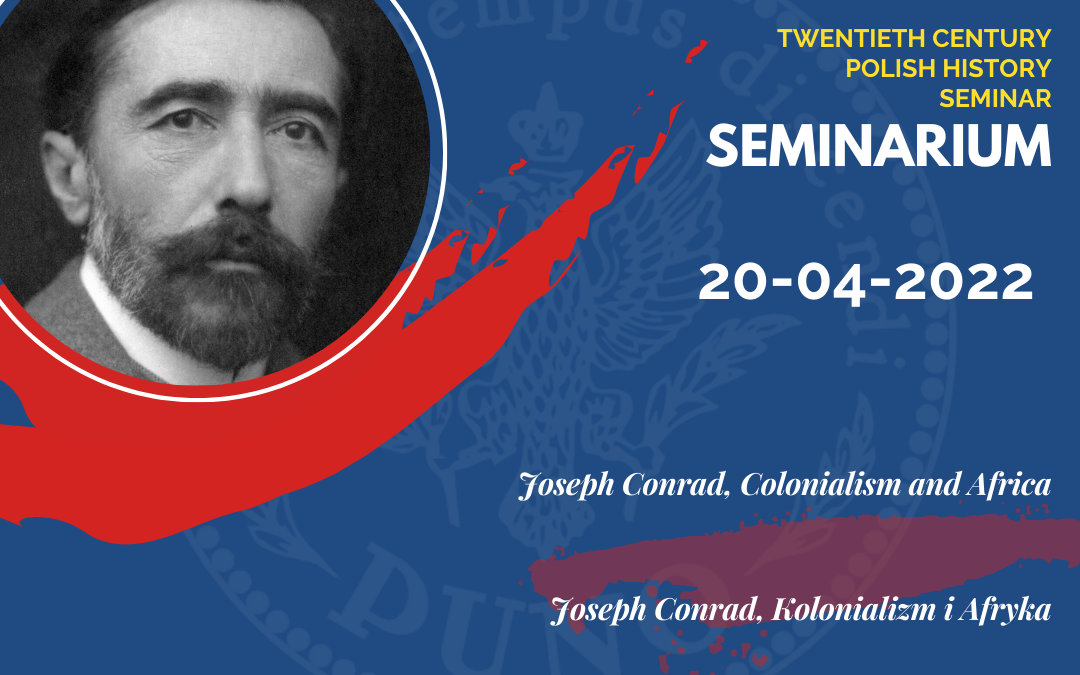Event
Joseph Conrad, Colonialism and Africa – Lecture by Professor Robert Hampson
he next twentieth century Polish history seminar will take place on 20 April at 6.15pm via Zoom. Professor Robert Hampson (University of London, Institute of English Studies) will present a paper titled ‘Joseph Conrad, Colonialism and Africa’. In this talk, Professor Hampson will consider Conrad’s engagement with colonialism in his African fiction. Although Conrad is associated in the popular mind with Africa, his early fiction drew on his experiences in the Malay Archipelago, and the Malay archipelago plays a much bigger part in his fiction than Africa.

Early reviewers described him as ‘annexing’ the archipelago for English literature, but, as Hampson will show, his depiction of Dutch and Spanish colonialism (and British interventions as well) is more sympathetic to the indigenous peoples than this would suggest. This provides the context for Conrad’s fictional engagement with Africa on which the talk will focus. When ‘Heart of Darkness’ was published, contemporary reviewers recognised its critique of King Leopold of Belgium’s takeover of the Congo. Hampson will discuss Leopold’s role in the Congo, but will also show how ‘Heart of Darkness’ (and Conrad’s other African story, ‘An Outpost of Progress’) extend their critique from the particular case of the Congo to the rhetoric of the ‘civilising mission’ that also underwrote other colonialisms.
Robert Hampson is a Research Fellow at the Institute for English Studies and Professor Emeritus at Royal Holloway, University of London. He is the author of three monographs: Joseph Conrad: Betrayal and Identity; Cross-Cultural Encounters in Conrad's Malay Fiction; and Conrad's Secrets, which won the Adam Gillon Award from the Joseph Conrad Society of America. He co-edited Conrad and Theory with Andrew Gibson and Conrad and Language with Katherine Isabel Baxter, and has recently published a critical biography, Joseph Conrad, with Reaktion Books. He is Chair of the Joseph Conrad Society (UK) and recipient of the Ian P. Watt Award for Excellence from the Joseph Conrad Society of America.
Time: Apr 20, 2022 06:15 PM London
Join Zoom Meeting
https://us02web.zoom.us/j/82061573209?pwd=eTRaTFVaNC80VFI2azkvSXorWlQ2QT09
Information
See also
Literature and Realities. The 11th Conrad Festival
According to the Organizers’s words, "the idea behind this year's edition of the Conrad Festival can be explained by two sentences constituting the extreme points of the axis on which we will move during the October discussions: We have different views on reality. There are many realities.”.
Jakub Barua: Polish roots, Kenyan camera – from Łódź to Nairobi
The Research Center on the Legacy of Polish Migration of the Polish Writers Abroad Charity (London) (OBeDeP) and Blue Point Art London warmly invite you to an online event in virtual London – a space for conversation where film becomes a map of memory, and biography a story of living “in between” cultures. We’ll be joined by Jakub Barua – a director, screenwriter and film producer born in Łódź (1967), who has lived and worked in Nairobi for many years. He is recognised as one of the pioneers of modern Kenyan cinema and a leading voice in an authorial, “poetic” approach to documentary film. In his work, history and lived experience of place intertwine with myth and symbolism, while his striking, almost painterly visual style guides viewers through themes of migration, identity and memory. In the second part of the event, Prof Aleksandra Łukaszewicz will present the project “Hybrid BIO_GEO-GRAPHIES of Jakub Barua” (Virtual Film Memorial) – an immersive format bringing together film, memory and technology (including VR), creating a virtual archive and a poetic map of belonging in a Poland–Africa dialogue.
Allen Kuharski, Richard Lowe: The Digital Archiving of Performance Data: The Case of Witold Gombrowicz / Otwarte zebranie Centrum Humanistyki Cyfrowej IBL PAN
BIO/HUMANITIES: REPRESENTATIONS OF LIFE
The Centre for Advanced Studies in the Humanities at the Jagiellonian University organizes this conference and seminar series in collaboration with national and international partners (Postcolonial Studies Centre, University of Wrocław; Department of Polish, Russian, and Lithuanian Studies, University of Illinois Chicago). It is part of the ongoing work of the bio.humanistyka research group.